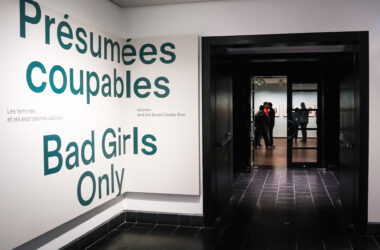HBO Max’s new film Unpregnant is not your typical teen comedy: The film explores abortion rights, the subtle casualness of rape culture, and the dominance of Christianity in America. While the plot is structured around a teenage girl’s struggle to have an abortion, Unpregnant is also a story of rekindling a lost friendship. Despite the film’s radical bend, especially in questioning the pervasiveness of heteronormativity in our society, Unpregnant offers flimsy queer representation. The film’s shortcomings are indicative of a problem endemic to the film industry, which often reduces representation to virtue signaling. It sidelines its queer characters, relegating them to subplots riddled with one-dimensional stereotypes and tropes.
Unpregnant is a feminist buddy-action movie that follows the journey of teenagers Veronica (Haley Lu Richardson) and her former friend Bailey (Barbie Ferreira) on a road trip to Albuquerque so that Veronica can have an abortion without her parents’ consent. The girls meet a variety of eccentric characters and encounter many obstacles on their way, giving Unpregnant a hilariously fast-paced and unexpected twist.
The film challenges heteronormative ideals that are typically omnipresent in most conventional teen movies. In one scene, Veronica’s boyfriend tracks her down to bring her a bouquet of flowers. Instead of taking this gesture to be romantic, Veronica chastises him, explaining that he is a creep for following her. Later, the girls have a choice between hitching a ride with a lesbian race car driver, Kira (Betty Who), or a seemingly friendly couple with a child. The girls decide to take the couple’s offer and, to their horror, discover that they are pro-life advocates who have kidnapped them. The heroes of a traditional rom-com become the villains of Unpregnant as the couple attempts to thwart Veronica’s plans.
While Unpregnant subverts normative expectations of heterosexual relationships, it fails to do much else. The film’s narrative is still centered on the struggles of a straight, middle-class, white cis-woman. The queer characters are not granted the same character development as the straight lead and exist solely to prop up Veronica’s personal narrative.
The queer characters in Unpregnant are shallow stereotypes, only serving to reinforce the heteronormativity that the film claims to dismantle. Media scholars have pointed out that the majority of 2SLGBTQIA+ characters in film and television are presented as either a villain or a victim. In Unpregnant, the audience is meant to pity the main queer character, Bailey, who is a social outcast, has a difficult home life, and spends more time online gaming than interacting with her peers. According to Ray Seif’s study on queer representation in the media, this portrayal reinforces the notion that members of the 2SLGBTQIA+ communities are a deviation from society’s norms and therefore must be outcasts.
Not only is the representation of queer characters in Unpregnant limiting, their time on-screen is also restricted. We only discover that Bailey is a lesbian halfway through the movie, and her romantic interaction with Kira makes up less than 10 minutes of the film’s running time. It appears as though the writers added in queer characters to appeal to a diverse audience without exploring their stories in-depth: The film quickly pushes asides its reveal of Bailey’s sexuality, and subsequently denies her and Kira’s relationship any time to flourish.
While Unpregnant addresses many important social issues more bluntly than its predecessors, the film does not give its viewers adequate queer representation. Unpregnant simply falls in line with Hollywood’s all-too-common tendency of tokenizing its diversity for viewership rather than dignifying its audiences with fully-realized, complex characters.









